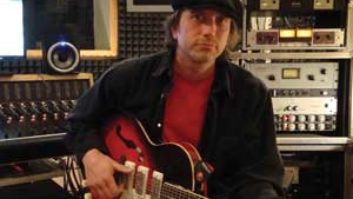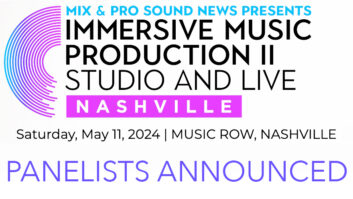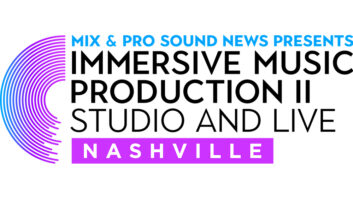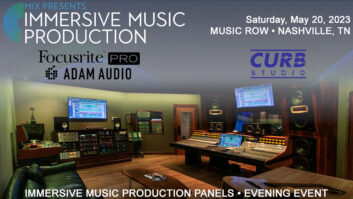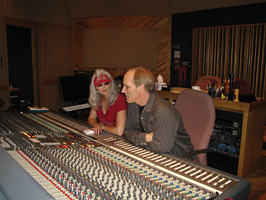
Producer/MPI founder Steve Fishell with former bandmate Emmylou Harris
Photo: Peter Cooper
There are manuals, for sure. And aspiring producers can follow directions in learning to tune vocals, set compression ratios and manage signal chains. So from there, it’s plug and play, right?
“You can’t plug and play,” says Steve Fishell, a Grammy-winning producer who has helmed sessions for Emmylou Harris, Little Richard, The Mavericks, Patty Griffin, Radney Foster, Pam Tillis, Gretchen Wilson and a slew of others. “There’s no ‘how-to’ video at YouTube that explains how to handle it when an artist tells you they have a headache and don’t feel like singing. Or what to do when a track is going down that is absolutely not happening and the feel is wrong.”
And so Fishell has founded MPI (www.musicpi.com), which stands for Music Producers Institute and which strives to offer up several years’ worth of stories, psychology and common sense in four days of study. The first session takes place June 17 to 20, 2008. It’s a post-graduate course of sorts, where students convene at the Sound Emporium and walk through a recording session, from conception to mastering. Fishell’s choice to work in a large, storied recording space was not incidental.
“Even with the proliferation of software and in a world where the earbud is a standard way for people to listen to things, people still crave music,” Fishell says. “I think we need to keep focused on the importance of great audio. Even when a smaller budget makes it necessary to record much of a project, including vocals and overdubs, in a living room, there is nothing like tracking in a professional room like the Sound Emporium.”
The Emporium’s Studio B is large enough for Fishell’s monthly class, which is designed for up to 10 participants, to gather around the Trident Series 80-B console, witness tracking sessions and ask questions. The recording space is 20×22 feet, with a high cathedral ceiling that allows experimentation with natural room reverb. Fishell produced Pam Tillis’ Number One hit “Mi Vida Loca” in that room.
At MPI, there is discussion of what microphones to use in what situations, but Fishell’s main interest is in conveying big-picture issues.
“This is about producing, and so 70 percent of it is not really technical,” Fishell explains. “It’s about artist psychology. It’s about pre-production, arranging and what to do when the artist is having difficulty in the vocal booth. It’s about how you know when the mix is finished, and it’s about the importance of mastering. It’s how to make in-roads, and how to make a productive pitch, and how to deal with A&R staffs. The information isn’t genre-specific. I’ve been in the studio with Little Richard, Bill Monroe, Mavis Staples and Earl Scruggs, and with any of these people, you speak to them, find out what will make them most comfortable and whatever that is, you get it for them. Little Richard wanted to hear himself through a speaker, not headphones, when he was singing. No problem. Bill Monroe didn’t want to hear anything except acoustic guitar and his duet partner, Pam Tillis’, voice. Makes sense. Why? Because it’s Bill Monroe.”
Fishell is a steel and electric guitar player who was an integral part of Emmylou Harris’ Hot Band in the 1980s. In that capacity, he watched up close as Harris and producer Brian Ahern worked in the studio, noting the ways that Ahern and Harris communicated, solved problems and wound up with recorded performances that are now legendary. In 1986, he and Howie Epstein (then bass man for Tom Petty’s Heartbreakers) worked up some demos on a country/rockabilly singer named Rosie Flores. The demos won Flores a contract with Reprise and earned Fishell a shot at producing major-label records. When Fishell exited Harris’ band, she smiled, and said, “Go forth and do country.” He’s done that and more, producing albums by Indigenous, Albert Lee and others.
Fishell intends the monthly Music Producers Institute programs to offer as much to aspiring rock, pop and R&B producers as to the country-minded set. To that end, he’s bringing in numerous guest speakers, including producer/engineer David Leonard (Prince, Rush, kd lang). “I asked David, ‘Would you talk about your vocal chain, from the microphone to the hard drive?’” Fishell says. “He said, ‘Of course, I have absolutely no secrets.”
Other guest speakers at MPI will include engineer Chuck Ainlay, producer/guitarist Buddy Miller, mastering engineer Andrew Mendelson and producers Jay Joyce, Frank Rogers and Ray Kennedy. Dave Sinko, who has worked on projects with Delbert McClinton, Sam Bush, Trisha Yearwood and many others, serves as chief engineer.
“We’re conducting sessions with a full band, and we’re walking through the recording process, from setup to tracking to vocals — with a microphone shootout — to overdubs to comping vocals,” Fishell says. “And then we’ll mix and master the recording. Students see exactly what happens to a song in a world-class recording environment. It’s five years of knowledge in four days. And they learn from the mistakes I’ve made.
“I began working in the studio around 1980, but didn’t start feeling comfortable until years after that,” Fishell continues. “It took me some time to feel like I was actually a producer. For the students, I want to tear down that wall of intimidation. The recording studio can make people nervous, but really it’s just a tool. Once you feel you have something to offer musically, you shouldn’t let that tool get in the way. Embrace it, and let it be your friend. If engineering isn’t for you, find a great engineer. If it is, then learn all you can about great audio.
“Gut instinct is something that we discuss. So often, it’s best to go with what your senses tell you.”
Send Nashville news to [email protected].

